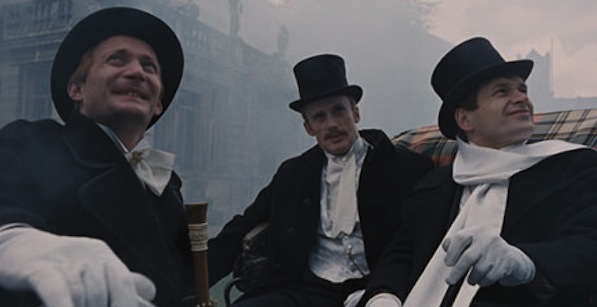Judging from reviews both past and present found online, The Promised Land, Andrzej’s first film to be nominated for an Oscar, is as vivid a portrait of the birth of industrial capitalism in 19th Century Europe as can be found in any film.
Konrad Eberhardt writes enthusiastically in the Polish Kino in 1974: “Promised Land shows us uncivilised capitalism, raw and realistic like some emanation of the animal nature of human beings.” However, according to German critic Michael Schwarze, the film was received in Poland “with many reservations:”
The main accusation against the director was that he equipped Borowiecki, a Pole, with the most disgusting features of the three. Such an interpretation was not faithful to the original, since Reymont’s novel was at times very anti-Semitic. (…)
In Wajda’s film, Borowiecki remains the most vicious and destructive character until the very end. According to Wajda his inhuman attitude was due to circumstances: Borowiecki, being the least wealthy, had to be particularly ruthless in order to achieve success. The value of this film lies in the ruthless assessment of Polish history, as it disproves the convenient thesis that the “bad guys” were always the Jews or the Germans.
Contemporary reviews seem unanimous in their acclaim for the film’s capturing of period detail and volatile depiction of a historical era coming into its own:
In The Promised Land, Wajda paints a fascinating human canvas of Lodz and its inhabitants – its old bourgeoisie, its cut-throat capitalists, and its emerging minorities. This was Lodz and Poland before the Nazis and before the communists, a dynamic city emerging from the miasma of medieval poverty as a forward-thinking modern polis. Wajda’s film is a song of lament for the multicultural Poland of the past and offers a vision of a diverse city where class and ethnicity took a back seat to ambition and progress – a vision as relevant today as a hundred years ago.
Adapted from the 1897 novel by Polish writer and Nobel laureate Wladyslaw Stanislaw Reymont, Land of Promise is a wry, incisive, and elegantly realized Dickensian tale of greed, human cruelty, exploitation, and betrayal… Inevitably, it is this volatile fusion of moral recklessness, inhumanity, and spiritual bankruptcy that is captured in the bleak and desolate baroque images of the film – the true human cost of social revolution that lays beneath the veneer of industrial progress, collective effort, and equal opportunity.
Richard J. Brzostek, Polish Movies Online:
“Promised Land” gives us a glimpse into the past and a chance to witness the poverty of the many and the wealth of the few. “Promised Land,” directed by Andrzej Wajda, is an exceptional film of the type that has earned him world fame… At times the film is gory and often tragic, but entirely a captivating story, worth watching.
“>Adam Michnik:
The Promised Land is a tale and a parable. It is a story about the little known genesis of Polish modern civilization, and a parable about a different facet of the Polish condition with its possible incarnations: an aggressive and ruthless descendant of a knightly family, and German and Jewish businessmen, who betray the moral codes of their religions and cultures.
Last but not least, Manufaktura gives some background on the film’s setting of Lodz, explaining how the city’s turbulent history is finally coming full circle to where it was depicted in the film, 100 years ago…




